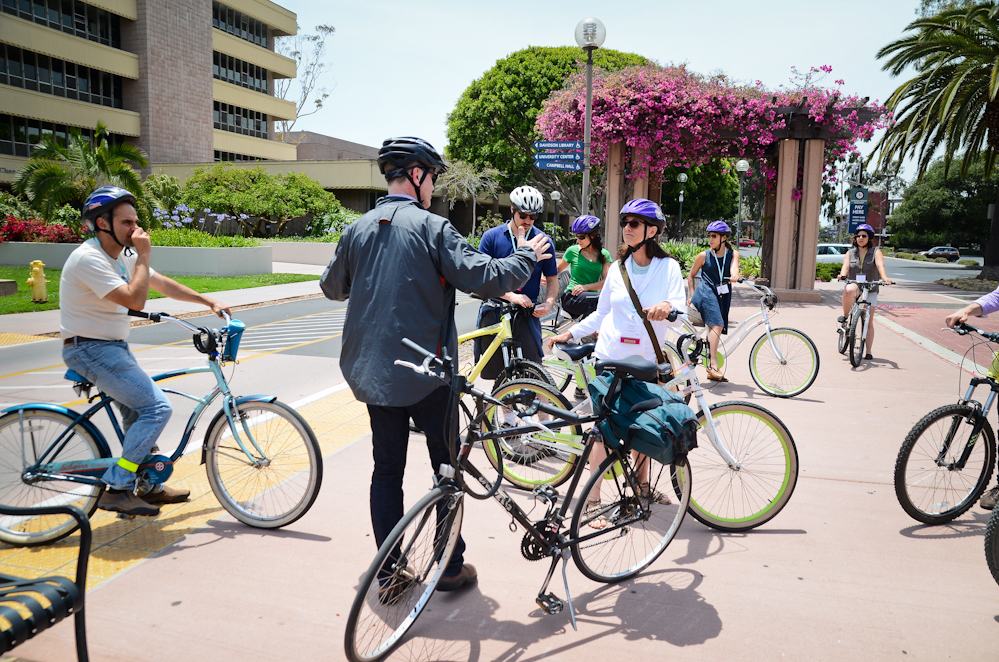
It's been said that you can't go home again. Tell that to UC Santa Barbara-based founders of the California Higher Education Sustainability Conference, who this week brought their biggest- and best-yet event back to the campus where it was created more than a decade ago.
The gathering was born in 2002, when 100 guests from across the UC system convened at UCSB to talk best practices. The conference now in full swing, and concluding Thursday, boasts 900 attendees representing some 80 institutions and organizations, including UC, CSU, California Community College, and private and independent campuses, as well as private industry and community members.
"One of the reasons we created this conference originally was because we found that too many people were doing things on their campus that someone on a different campus, in another part of the state, had already done," Katie Maynard, event manager for the conference, and sustainability coordinator in UCSB's geography department, said Monday. "We're hoping our attendees take away tangible ideas about what they could implement by giving them an opportunity to learn from their colleagues, learn what's already happening, what's possible, and what's been done and proven on another campus so they don't have to reinvent the wheel."
Hoping to bring greening into greater consciousness by sharing strategies for effective storytelling around such efforts, this 12th annual event bears the theme "Declare, Demonstrate, Propagate." Featuring research presentations, as well as case studies in curriculum development, operational programs, and community partnerships, it is intended to be an idea-sharing festival –– a massive, multi-day brainstorming session of sorts –– as much as a source of inspiration.
Speaker Eban Goodstein, who delivered the opening keynote Monday morning, provided much of the latter.
Director of the Bard Center for Environmental Policy in Annandale-on-Hudson, NY, and of the Bard MBA in sustainability, Goodstein issued a call to action –– to students, in particular –– imploring society at large to lean on its younger generations for sustainability leadership and innovation.
"We're living in a truly extraordinary moment in the history of the human experiment," Goodstein said. "The work that we're going to do together, over the next three decades, is going to have a profound impact –– not only on our own lives and the lives of our children, but in fact for every human being and every creature that's going to inhabit the face of this earth until the end of time."
Veronica Acosta-Deprez is all in. A professor of health science at CSU Long Beach, where she sits on the campus sustainability taskforce, she came to the conference hoping to glean ideas for further integrating green themes into her curriculum –– and getting more of her fellow faculty to follow suit.
"Sustainability is very important, not only locally, but for global health, and for global change, to really save our world," Acosta-Deprez said. "It's really important for us to think this through and try to integrate it not only into our own personal lives, but in a more systemic way. Sustainability impacts the health of children and their literacy rates. If they're unhealthy, they can't go to school; they're uneducated, so they're unable to find jobs. It's a cycle of poverty that's endless, and one of the reasons why is because of the lifestyle we are living here in developed countries."
With the conference –– and with its own well-regarded sustainability efforts –– UCSB is hoping to provide impetus for adjustments to that lifestyle. Field trips both on campus and off, including bike, bird-watching, and building tours, are spotlighting myriad green initiatives of UCSB and its surrounding communities, in everything from communication strategies and waste reduction to energy management and green healthcare.
"To achieve full sustainability, we have many challenges ahead," said Pam Lombardo, acting associate vice chancellor for administrative services at UCSB and co-chair of the Chancellor's Sustainability Committee. "Creativity and innovation are necessary to help us to achieve those next steps, and conferences like this one that encourage idea sharing and brainstorming among colleagues are a great place to start. … We have a long way to go, but the turnout here today shows that the commitment to this goal is both strong and spreading."
The conference continues through Thursday. A full slate of workshops, field trips, and presentations on Tuesday will feature a 4 p.m. closing keynote by Drew Dellinger that is free and open to the public. Highlights on Wednesday include excursions to Coal Oil Point Reserve, the campus culinary garden at Westmont College, and an eco-friendly winery.
Related Links



